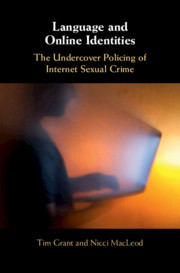
-
Select format
-
- Publisher:
- Cambridge University Press
- Publication date:
- 10 February 2020
- 13 February 2020
- ISBN:
- 9781108766425
- 9781108487306
- 9781108720038
- Dimensions:
- (228 x 152 mm)
- Weight & Pages:
- 0.42kg, 212 Pages
- Dimensions:
- (229 x 152 mm)
- Weight & Pages:
- 0.317kg, 213 Pages
You may already have access via personal or institutional login
Book description
Forensic linguistics is at the cutting edge of the undercover policing of child sexual abuse on the open internet and dark web, and language and identity is a fundamental part of this. The authors have drawn on their extensive experience in training undercover officers to develop innovative methods in identifying the creation and performance of online personas, crucial in detecting identity disguise online. This groundbreaking book demonstrates these methods through case studies, whilst also exploring the link between language and identity. By bringing together previously opposed positions in forensic authorship analysis, the book develops a novel theory of linguistic identity, which will resonate not just in forensic authorship research but in sociolinguistics more widely. This unique forensic linguistic project has real-life impact in assisting the police in their investigation of online abusers, and has impact for students and researchers of linguistics, through its contribution to the research of linguistic identities.
Reviews
‘Language and Online Identities is a very readable book crammed with newly researched, important and often disturbing material of a kind not publicly available before and all well illustrated with fascinating examples.'
Malcolm Coulthard - Federal University of Santa Catarina, Brazil
‘The authors should be commended for their incredibly important work in this area. The field of forensic linguistics is better for it, not only for how it has already helped law enforcement, but also for the ways in which we can use the information presented here to help protect the vulnerable in the future in an ever-increasingly online world.'
Karen E. Lillie - State University of New York, Fredonia
Contents
Metrics
Altmetric attention score
Full text views
Full text views help Loading metrics...
Loading metrics...
* Views captured on Cambridge Core between #date#. This data will be updated every 24 hours.
Usage data cannot currently be displayed.
Accessibility standard: Unknown
Why this information is here
This section outlines the accessibility features of this content - including support for screen readers, full keyboard navigation and high-contrast display options. This may not be relevant for you.
Accessibility Information
Accessibility compliance for the PDF of this book is currently unknown and may be updated in the future.


